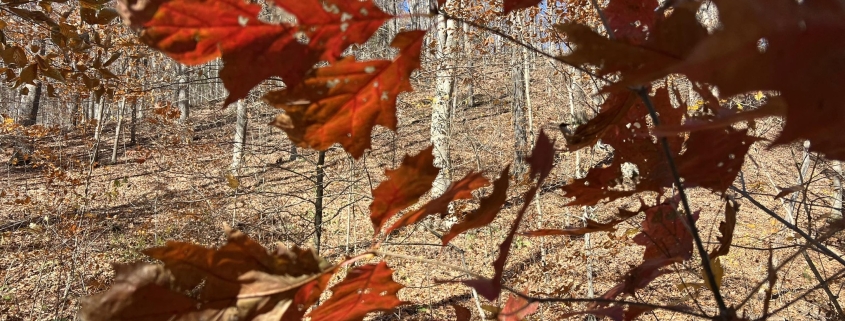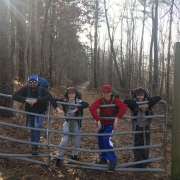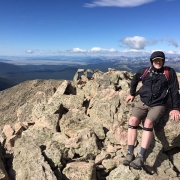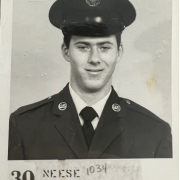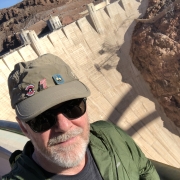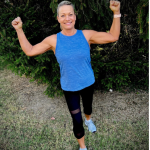Using Overeaters Anonymous to Break Up with Food | Healthy Aging Series: S9 E15
One of my favorite movies is “Signs,” by M. Night Shyamalan. Please don’t judge me :-)
One of my favorite scenes is when Graham, the former Episcopal priest, who had just lost his wife to an accident is having a conversation with his brother Merrell about the appearance of lights in the sky. Merrell is struggling to understand what is happening, how is this going to end? He wants to be comforted by his brother, the former man of faith. Here’s what Graham says to Merrell:
People break down into two groups. When they experience something lucky, group number one sees it as more than luck, more than coincidence. They see it as a sign, evidence, that there is someone up there, watching out for them. Group number two sees it as just pure luck. Just a happy turn of chance. I’m sure the people in group number two are looking at those fourteen lights in a very suspicious way. For them, the situation is fifty-fifty. Could be bad, could be good. But deep down, they feel that whatever happens, they’re on their own. And that fills them with fear. Yeah, there are those people. But there’s a whole lot of people in group number one. When they see those fourteen lights, they’re looking at a miracle. And deep down, they feel that whatever’s going to happen, there will be someone there to help them. And that fills them with hope. See what you have to ask yourself is what kind of person are you? Are you the kind that sees signs, that sees miracles? Or do you believe that people just get lucky? Or look at the question this way: Is it possible that there are no coincidences?
You have to ask yourself, what kind of person are you?
This season I’ve been writing about the very serious struggle that many of you are having with food. For some, it’s a life-or-death struggle because you feel powerless over food and it’s creating a dark cloud over your future much like the lights, threatening Graham, and Merrell‘s future.
I want to share two roads, two ways to help you break up with food once and for all. Which road is for you? It depends. It depends on what type of person you are.
Are you the kind of person that feels a sense of powerlessness over food and you need a higher power to take away your shortcomings?
Or, are you kind of person that sees yourself as powerful and you have the ability to overcome your problems with food?
I know, I know, it’s not quite that simple. Most of us are not one or the other, but sometimes, it helps to see the issue as “one or the other.”
If you mostly see yourself in group one, then Overeaters Anonymous is most likely the road to take in overcoming your compulsive overeating. We will look at group 2 in Episode 16. Both Roads have very similar “hacks” or tools for breaking up with food, but at the heart, the issue is where does the power come for overcoming your problem with food?
First Overeaters Anonymous
How does Overeaters Anonymous work?
It’s a 12-step program similar to Alcoholics Anonymous. There are also 12 Traditions. Think of them as bylaws. They guide members on the day-to-day operations.
The 12 steps are strategies for helping you to think and act differently about food, yourself, others, and God.
Here are the first three steps:
- We admitted we were powerless over food, and that our lives had become unmanageable.
- Came to believe that a power greater than ourselves could restore us to sanity.
- Made a decision to turn our will and our lives over to the care of God, as we understood him.
For many, these steps help them gain a sense of meaning and hope in life. They have unsuccessfully tried to manage their eating or drinking, and finally they are able to see something or someone out there that will remove all of their shortcomings. They get better.
In their literature, they write, “As a result of practicing the steps, the symptoms of compulsive eating and compulsive food behaviors are removed on a daily basis. For most of us, abstinence means freedom from the bondage of compulsive overeating, achieved through the process of surrendering to something greater than ourselves; the more total our surrender, the more fully we realize our freedom from food obsession.”
The other steps involved admitting to God, to ourselves, and to another human being those shortcomings. They involve making amends to people who we have harmed and working on our relationship with God through prayer and meditation. The last two steps encourage us to help others who have an addiction to food, those who are compulsive overeaters. Overeaters Anonymous members see the problem as mental, physical, and spiritual.
Those are the Steps, but then there is the Program.
As I’ll share in the next episode, this is where the approaches overlap or where the different roads converge at times. Every plan, every program is unique, despite having many similarities.
Here is the general look at the AA Program. This is what they mean when they say in unison at the end of the meeting, “It works, if you work it!”
- Attend meetings regularly. Overeaters Anonymous is a fellowship. It is a fellowship of fellow strugglers and people who are recovering, growing, overcoming their shortcomings. They share what it was like before Overeaters Anonymous, what happened to bring about their change and commitment to change, and what life is like now. You go. You keep your mouth shut and your ears open. You listen to the success stories. You keep coming back. You take what you like and leave the rest.
- Get a sponsor. After attending several meetings and listening to the success stories, you approach the member who you think can help you through the steps. This is life or death, and your sponsor will be the life preserver that will help you stay afloat during the years and storms to come. What does a sponsor do? They listen without judgment. They use their experiences as a sponsor to guide you through the steps. They are there to help you follow your plan. You call them when you feel powerless or when you feel like you’re going to relapse. Overeaters Anonymous is a relapse prevention program that helps you break up and stay broke up with food. You will need a sponsor.
3. Make a Plan of Eating. You make a list, with the help of a sponsor and possibly a nutritionist, of the foods and drinks that you are powerless over, your Trigger Foods. These foods, along with accompanying behaviors, are what’s keeping you in a dysfunctional relationship with food. “An individualized food plan is a tool designed to help you know what and when to eat. It is a flexible, usable worksheet that assists with maintaining absence from compulsive overeating and compulsive foods behaviors” (The Brown Book).
You develop your food plan with the help of a sponsor. You make a commitment to follow the plan one day at a time. That’s your sobriety date. And with the help of your higher power, your sponsor, and the fellowship, you follow this plan one day at a time. You work the steps. And you work your Eating Plan, and you find sanity, freedom, and strength.
Overeaters Anonymous will not be for everyone. Allen Zadoff, from the book “Hungry,” found freedom from food using Overeaters Anonymous.
My next episode is for the other kind of person. Moderation Management for Eating (MMFE) is what I call it.
Do you see yourself as having the power to change within yourself? Then check out my next episode.
To read more entries in the Healthy Aging series, click here.

